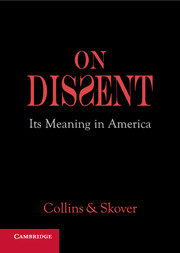Book contents
- Frontmatter
- Contents
- Informationis Personae
- Prologue
- Chapter I From Judicial Dissent to Peaceful Protest
- Chapter II From Civil to Uncivil Disobedience
- Chapter III The Vagaries of Violence
- Chapter IV Dissent, Inc.
- Chapter V Dissent and Law's Parameters
- Epilogue
- Notes
- Acknowledgments
- About the Authors
- About the Informationis Personae
- Select and Annotated Bibliography
- Index
Prologue
Published online by Cambridge University Press: 05 May 2013
- Frontmatter
- Contents
- Informationis Personae
- Prologue
- Chapter I From Judicial Dissent to Peaceful Protest
- Chapter II From Civil to Uncivil Disobedience
- Chapter III The Vagaries of Violence
- Chapter IV Dissent, Inc.
- Chapter V Dissent and Law's Parameters
- Epilogue
- Notes
- Acknowledgments
- About the Authors
- About the Informationis Personae
- Select and Annotated Bibliography
- Index
Summary
Dissent. It is a word we all know, and yet do not know.
We use the word with regularity in any variety of contexts. Judges dissent against a court majority. Political activists dissent against the establishment. Religious protesters dissent against orthodoxy. Students dissent against an administration. Newspaper editorialists dissent against politicians. Employees dissent against management. The list goes on.
In these ways and others, America values dissent, or so it seems. We often tolerate, encourage, and protect dissent. It is part of our Madisonian heritage. Some preach it, some practice it, others safeguard it, and still others endure it even when they oppose its message. Dissent is a salient feature of our modern society. It is a cultural and constitutional given.
Over the ages, dissent has been championed for assorted reasons. Dissent, it might be said, promotes self-realization and autonomy. It enables individual self-expression without fear of societal repression. The liberty of self is meaningless if one must always conform to majority will. Freedom for the outsider allows a unique brand of self-identity and self-expression.
Dissent, it might be said, advances religious freedom. When people of faith are permitted to question prevailing beliefs, they stand to redefine the relationship between themselves and their Maker. This spirit of moderation extinguishes the fires of heresy.
- Type
- Chapter
- Information
- On DissentIts Meaning in America, pp. xi - xxPublisher: Cambridge University PressPrint publication year: 2013



